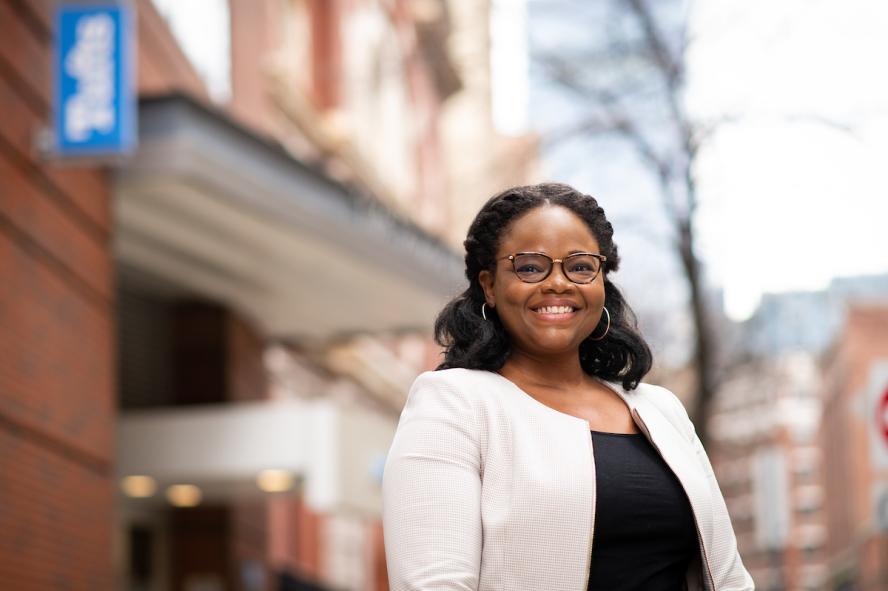-
About
- Departments & Offices
-
Academics
- Physician Assistant
- Special Master’s (MBS)
-
Admissions & Financial Aid
- Tuition & Fees
-
Student Experience
-
- Student Resources by Program
- Academic & Student Support
- Wellness & Wellbeing
- Student Life
- Events & Traditions
-
-
Research
- Research Labs & Centers
-
Local & Global Engagement
- Global Health Programs
- Community Engagement
Caring for Women, Advocating for Change
Globally and locally, LeAnn Louis looks toward equity in women’s health

As the daughter of Haitian parents, LeAnn Louis, M21, MG21 (MPH), has long been concerned with the disparities in global health. She was still young when her aunt, on a visit to Haiti, suffered a sickle cell crisis and died. It wasn’t until Louis was an undergraduate shadowing the staff at a women’s hospital in Haiti that she saw how few health care resources were available there.
“Some people didn’t have beds,” she said. “A lot of women were laboring on the floor. Following delivery, there weren’t supplies to clean up. It was a stark revelation to me of what women’s care is like around the world.”
It started her on a path to becoming a physician and advocate for women’s health, roles she continues to grow into as she prepares to begin an OB/GYN residency at the University of Michigan.
Whether she is helping a mother give birth or talking to a teen facing her first period, Louis said she feels “honored to be part of their journey.” Growing up in a religious household where sexual health was not talked about, Louis remembers the relief she felt the first time a physician gave her answers she needed; she now seeks out opportunities to do the same for other women. On her rotations at Tufts, she earned something of a reputation among her preceptors for gravitating toward young female patients who might have questions. “Even on my surgery rotation, they were like, ‘Aren't you the girl who likes pregnant people?’
In her first year at Tufts, she helped Ndidiamaka Amutah-Onukagha, an associate professor of public health and community medicine, organize Boston’s first Black Maternal Health Conference, now an annual Tufts event, which brings together OB/GYNs, midwives, doulas, and medical students to talk about the needs of Black mothers and infants. To help mothers directly, she and two classmates are trying to create a community service program that would train medical students of color as doulas, who provide physical and emotional support during pregnancy, childbirth, and the postpartum period. “So many minority women are not able to afford doulas or even know what doulas are,” she said.
Those same women tell her they do not trust the health care system. “A lot of them are afraid,” she said—of hospitals, of statistics that show Black women are more likely to have poor outcomes during childbirth, of doctors who might not prioritize their interests. When she tells Black women that she will be an OB/GYN, she said she always gets sighs of relief. “They see me and say, ‘Okay, here is someone who looks like me. I might not die.’”
Louis is quick to speak out against injustices. Since her first year at Tufts, she has been active in the school’s anti-racism efforts through focus groups and the Student National Medical Association, but became even more involved in her junior year when she became a student representative on the teams that evaluate clinical rotations, or clerkships. “Many of my friends would tell me stories about egregious things that happened to them on the ward, things that the deans weren’t hearing about,” she said, including racist, sexist or otherwise inappropriate or hurtful comments from patients or staff.
She worked with students and administrators to create a workshop for all the third-year MD students on how to respond to microaggressions or inappropriate treatment in their clerkships. Some students shared their stories for a video. “We had Black students, an Asian student, white students, and a student who identifies as LGBT, discuss some of the microaggressions they experienced on the ward,” Louis said. “To me, it was very powerful.”
The school also added questions about microaggressions to its clerkship evaluations, so that the deans, site directors, and student representatives can follow up. That, combined with the efforts she has seen as a member of the school’s Anti-Racism Task Force this past year, makes Louis optimistic that change is possible.
“I see such a bright future for Tufts, because there's so much that is actually being done,” she said. “I'm really proud that I had something to do with it, but Tufts has just taken the ball and so far surpassed what I even thought this would come out to be.”